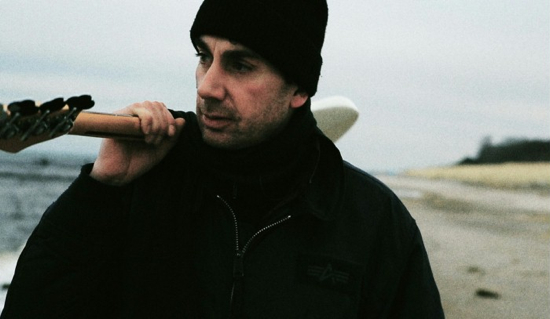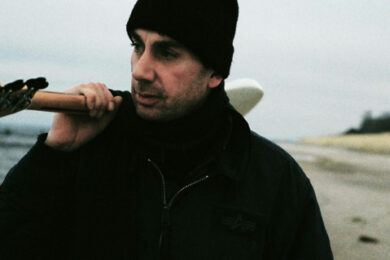Berlin-based director Uli M Schueppel has always been fascinated by artists who relentlessly push their work forward, regardless of trends and expectations. Thanks to documentaries such as The Road To God Knows Where (1989 vintage Nick Cave & The Bad Seeds on tour in America), Elektrokohle (Von Wegen) (aka Off Ways, starring Einstürzende Neubauten) and 2007’s BerlinSong (about the city’s underground singer-songwriter scene), Schueppel has earned a reputation as a filmmaker who focuses on exploring musicians’ emotions and ‘soul landscapes’.
His latest profile, Brötzmann – That’s When The World Is Mine, shines a light on cult guitarist Caspar Brötzmann who, since the 1980s, has influenced artists as wide ranging as Thurston Moore, Rammstein and Sunn O))). Using a 2010 concert at Berlin’s Berghain Club as his starting point, Schueppel takes the viewer on a trip into Brötzmann’s deepest thoughts and dreams. The director kindly agreed to chat to us before the film’s premiere at last month’s Berlinale festival.
Tell me about the filming of Brötzmann – That’s When The World Is Mine.
Uli M Schueppel: The true story? It’s quite absurd. The last time I saw Brötzmann live was at the end of the ’80s as the opening act for Nick Cave at the Metropol in West Berlin. At that time Nick Cave was at a totally different level. There were the ballads, all the mellow stuff. Same with Neubauten; it was the time of their more melodious material. Me personally, I was more on that level too. I appreciated Caspar but we’d all come out of the early ’80s and punk, so I was happy about that switch. So anyway, Caspar’s stuff seemed a little alien to me at that point, albeit exciting. He was always present with the people I worked with then, like Alexander Hacke and FM Einheit, but we didn’t really know each other.
And then in 2010, Eduardo [Delgado Lopez], the bass player from [Brötzmann’s power trio] Massaker, said that the old band was getting back together and that it was all happening at Berlin’s Berghain club. He inquired if I could perhaps film the show. Now, I get asked this kind of stuff twice daily by friends’ bands. But the thing was, I’d never been to Berghain. And since the club was surrounded by so much hype, I thought this might be a good moment to check it out. So I asked my camera operator and we both said, "Right, let’s do this!" But I had to get to know Caspar first. We met once before the show, slowly approached each other and both got on from the get-go, really.
The concert that night, it just totally blew both my cameraman and I away. It was so intense and big. I’d have to say now that it was one of the important gigs of my life. And so it made me really happy that, although equipped with only two small cameras, we got to capture it. So afterwards we had all that footage and I thought, ‘Damn, what to do with it?’ But then I found myself intrigued with this person that I’d been following all day. I didn’t quite understand how the two [the music and Brötzmann] work together. Where did that music come from? Where did those lyrics come from? So, that was the starting point to go on a bit of a journey with him – in the real sense but also in the sense of a journey within Caspar, to explore the landscapes and soundscapes within himself, his ‘soul landscapes’.
How did you proceed with the shoot?
UMS: Initially Caspar and I just hid away in my kitchen, and I slowly managed to tease some ‘dreams’ out of him. I recorded those straight away and those are the voiceovers we hear throughout the film. After that we just up and left to find the ‘other spaces’, the spaces in his head and the spaces in his soul.
Did you have a concept or a script?
UMS: The basic concept was to find out where Caspar’s music comes from but without doing it along the lines of a band biopic, the way we normally know from documentary filmmaking.
The obvious thing would have been to talk to his father, to Sonic Youth, to Rammstein, etc. And that way we could’ve done a feature film that would’ve probably sold a thousand times better. But I decided against that, I simply wasn’t interested. You can google all that information these days anyway. I was interested in the stuff that you can’t find on the web. I wanted to find out about what’s beyond that, the things you might be able to get a glimpse of if you were to go out drinking with Caspar for a week. Because he is a sensitive person, there are not a lot of Brötzmann interviews out there in which he really opens up.
Was Caspar able to fully open up in front of your camera?
UMS: Well, it was a really intimate setting: my cameraman, Caspar and I. And luckily Caspar really gelled with both of us. And you can feel that. He’s talking about things in the film he’s simply never spoken about before.
Tell me about your choice of locations.
UMS: I was inspired by his music and lyrics, which deal with basic elements like fire and water. So I tried to incorporate those elements. And it’s about magic, the way he plays. So the cameraman and I suggested places. Places that have magic about them, for us personally. So we went south of Berlin, going towards the sea. I needed places with lush forests and wide horizons. I myself drove, Caspar was seated next to me and in the back we had Cornelius [Plache], the cameraman. He had already set up a pre-editing facility and he was working on the cut while we drove through the night. I’d never experienced filming in that manner. We were like a band, together for a week, in our own little world.
Did you keep the camera rolling at all times?
UMS: No, it was definitely conceptually used for the specific locations. But we had some incredible off-the-cuff moments. Like when Caspar’s playing the bass in front of a campfire next to a frozen lake. The layer of ice vibrated and created sounds and he was playing along to those sounds. These things, you definitely can’t plan them in advance.
Tell me about the editing.
UMS: It was very complicated. Because… I don’t really know how to explain it properly. The kind of films that I’ve been making for the past few years now, are all without dramatic composition, and work more like pieces of music. They rise and fall alongside minor changes. Editing a documentary is always more difficult anyway, than editing a feature film with a solid script. We edited for a long time, almost six months.
In your previous films about musicians you always chose to omit performance-related material. So why did you decide to employ a substantial amount of live footage this time?
UMS: With the Nick Cave film, with BerlinSong and the Neubauten film, I left out the concert footage. I always thought it to be fake. I can’t think of a single concert film that makes me feel like I’m there, smelling the place and getting shoved by other fans. And besides, a concert is a piece of art in itself. So I think it’s idiotic to film a piece of art in order to turn it into your own art piece. The reason I’m using live footage here is more for practical reasons – for one, it was extremely important to have the element of Caspar’s music clashing against the serenity and against this other side to Caspar’s personality. And of course, with Nick Cave and Neubauten, everyone knows the music. There’s not much left to tell. Brötzmann, on the other hand, has a much smaller circle of followers. And if you’re doing a film like that, you want to open something up for the person you’re doing a portrait of. You want to allow more people to hear Caspar’s music. So I think it was important to have the music in the film. And in the end, using only two cameras for the live footage was a nice thing in that I’m not even attempting to convey the feeling of the concert. You simply realise, ok, here’s two cameras. They’re employed to convey the idea of Brötzmann and his music.
What did Caspar make of the finished version of the film?
UMS: Showing a film to the person it’s about is always a bit of a delicate situation. It was extremely important to me to that it really constituted Caspar’s world. And it did. He’s very happy with the film. That really is his world.
For more information about the film check Uli M Schueppel’s website.




